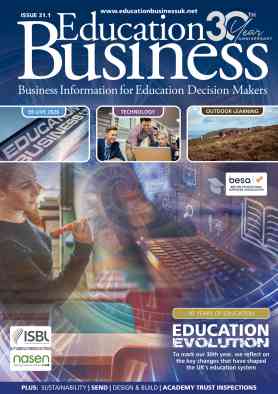
Is your school prepared for ChatGPT and AI?
Most schools are unprepared for the impact that ChatGPT and AI will have on teaching and learning, according to research of computing teachers. But rather than banning AI, teachers need more support to harness its potential. Victoria Temple from BCS, The Chartered Institute for IT, explores the topic
Is your school prepared for ChatGPT and the rise of AI? Do teachers know how to use it for a tool for learning? Recent research of computing teachers suggests not.
The findings come as a new free guide, ChatGPT for Teachers, written by a computing teacher, offers support to teachers wondering where to start.
The research conducted by BCS, The Chartered Institute for IT, with its Computing at School (CAS) teacher network, found that 62 per cent said chatbots like ChatGPT will make it harder to mark students’ work fairly.
The majority (56 per cent) of the 124 computing teachers in the study, did not think their school had a plan to manage incoming use of ChatGPT by pupils. A third reported that early discussions had taken place and a further 11 per cent said a plan was being formed.
ChatGPT is a large language model (LLM) which can answer questions in a seemingly natural way, and is trained on a massive data set. It has been shown to be able to create passing grade answers at university level, but it is fallible. A recent public demo by Google’s own AI service, Bard, produced a wrong answer.
Awareness of ChatGPT
Over three-quarters of computing teachers (78 per cent) rated the general awareness of the capabilities of ChatGPT among colleagues at their school or college as ‘low’ or ‘very low’.
However, 45 per cent of the computing teachers were confident ChatGPT is a tool that will improve teaching in their school, long-term. For example, helping to plan assignments and support students with research techniques.
Computing teacher Evan Dunne has written a free guide for teachers with tips and advice about how to use ChatGPT to improve and develop teaching. His ‘ChatGPT for Teachers’ guide has been published by Computing at School (CAS) as part of its free library of resource materials and is available to download from the CAS website.
“The capabilities of AI chatbots in transforming education and assessment are only beginning to be recognised by schools and teachers,” said Evan.
“Beyond the ability to generate, for instance, an adequate essay, ChatGPT also has immense potential for revolutionising learning. But despite enthusiasm from tech-savvy educators and computing teachers, a significant knowledge gap exists among the teaching community regarding how to use ChatGPT and its competitors,” said Evan.
“This knowledge gap leaves teachers struggling to navigate the uncharted waters of these powerful technologies.”
The knowledge to navigate AI
To address this, Evan’s ChatGPT for Teachers guide aims to equip teachers with the knowledge and strategies necessary to effectively navigate the rise of AI in education. The guide covers topics such as identifying AI-generated work, setting clear guidelines and expectations, educating students on the risks and ethics of using AI-generated work, and considers the use of AI-generated work for educational purposes.
“As a tool, ChatGPT is incredibly versatile, with the potential to generate human-like responses to text-based prompts. However, teachers are of course concerned about the possibility of students using AI to generate work that appears to be original,” said Evan.
He explained that signs of AI-generated work may include a lack of coherence or complete understanding of a topic, as well as odd phrasing resulting in unnatural sentence structures. And training and teacher skill is also likely to improve and develop.
“Although AI detection software is still in its early stages and not always effective at detecting plagiarism or AI-generated content, teacher training courses in this area are likely to become more prevalent as educators seek to better identify and prevent plagiarism,” he said.
Julia Adamson, MD for education and public benefit, at BCS, The Chartered Institute for IT agreed that giving teachers the skills to use AI as an educational tool will be increasingly important.
“Assuming these generative AI programmes remain freely accessible, teenagers are going to use them to answer homework assignments – just like adults will come to rely on them at work,” she said.
“Computing teachers want their colleagues to embrace AI as a great way of improving learning in the classroom. However, they think schools will struggle to help students evaluate the answers they get from chatbots without the right technical tools and guidance.
“Calculators used to be banned from exams but are now mandatory. We need to bring machine learning into mainstream teaching practice, otherwise children will be using AI for homework unsupervised without understanding what it’s telling them.”
Latest News
03/03/2026 - 09:57
The Scottish Government is rolling out a National Primary School Swimming Framework, a universal offer to primary aged children to learn to swim alongside learning vital water safety skills.
03/03/2026 - 09:37
Senior HM Inspector Adam Sproston will discuss the inspectorate’s approach to SEND and inclusion at Education Business LIVE in March.
02/03/2026 - 10:07
Children’s charity Youth Sport Trust has awarded the first Well School accreditations, recognising schools that are prioritising pupil and staff wellbeing alongside academic performance as a measure of success.
02/03/2026 - 09:39
The government has launched a major new consultation to gain views on how to keep children safe online across social media, AI chatbots and gaming platforms.
27/02/2026 - 14:12
LGfL-The National Grid for Learning has launched a free Artificial Intelligence (AI) Policy Toolkit to help schools across the UK develop clear approaches to AI that put safeguarding at the forefront.







